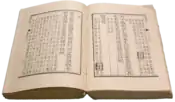Verse (poetry)
In the countable sense, a verse is formally a single metrical line in a poetic composition. However, verse has come to represent any division or grouping of words in a poetic composition, with groupings traditionally having been referred to as stanzas.
| Literature |
|---|
 |
| Major forms |
| Genres |
| Media |
| Techniques |
| History and lists |
| Discussion |
|
|
In the uncountable (mass noun) sense verse refers to "poetry" as contrasted to prose.[1] Where the common unit of verse is based on meter or rhyme, the common unit of prose is purely grammatical, such as a sentence or paragraph.[2]
In the second sense verse is also used pejoratively in contrast to poetry to suggest work that is too pedestrian or too incompetent to be classed as poetry.
Types of verse
Blank verse
Blank verse is poetry written in regular, metrical, but unrhymed, lines, almost always composed of iambic pentameters.
Of Man's first disobedience, and the fruit
Of that forbidden tree, whose mortal taste
Brought death into the World, and all our woe,
With loss of Eden, 'till one greater Man
....
—John Milton (from Paradise Lost)
Free verse
Free verse is usually defined as having no fixed meter and no end rhyme. Although free verse may include end rhyme, it commonly does not.
Whirl up, sea—
Whirl your pointed pines,
Splash your great pines
On our rocks,
Hurl your green over us,
Cover us with your pools of fir.
—H.D.